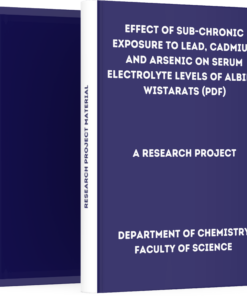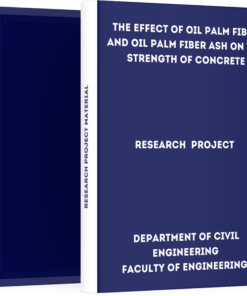Effects of Detoxification on some Pharmacological Properties of Jatropha Curcas Linn. (EUPHORBIACEAE) Seed Oil in Laboratory Animals
₦3,000.00
If you are interested in getting this project material “Effects of Detoxification on some Pharmacological Properties of Jatropha Curcas Linn. (EUPHORBIACEAE) Seed Oil in Laboratory Animals”, click on the DOWNLOAD BUTTON to make payment and the file will be delivered to your email immediately after confirmation.
Description
– Effects of Detoxification on some Pharmacological Properties of Jatropha Curcas Linn. (EUPHORBIACEAE) Seed Oil in Laboratory Animals –
Download Effects of Detoxification on some Pharmacological Properties of Jatropha Curcas Linn. (EUPHORBIACEAE) Seed Oil in Laboratory Animals. Students who are writing their projects can get this material to aid their research work.
Abstract
Jatropha curcas seed oil is a known energy source in biodiesel which but for its toxicity, also has potential of being used as food and in the pharmaceutical/cosmetic industries.
This study was designed to detoxify solvent and mechanically extracted J. Curcas oils and to ascertain the effects of detoxification on acute and sub-acute toxicities as well as on analgesic and laxative activities in laboratory animals.
Following determination of the physicochemical properties of the extracted oils, detoxification of the oils was attempted by both the usual synthetic method of orthophosphoric acid degumming, sodium hydroxide deacidification, tonsil decolorization, and vacuum-heat deodorization.
And by the use of natural materials in place of the synthetic agents such as distilled water for orthophosphoric acid, plantain peel ash extract for sodium hydroxide and bentonite for tonsil. Phytoconstituents, elemental and phorbol esters compositions of the oils were also determined.
Acute toxicity studies for LD50 determination and sub-acute (14 days) studies for toxicity symptoms of the mechanically extracted oil in male rats were carried out. Weight changes, mortality, hematological liver/kidney assessment as well as histopathological analyses of liver, kidney and intestines were checked.
Wherever appropriate olive oil was used as vehicular control. Statistical analyses were by ANOVA with appropriate post hoc tests. The extraction yields of the oils were 49.1% (petroleum ether solvent) and 14.9% (hand operated hydraulic screw press).
The physicochemical properties of the extracted oils were similar. Alkaloids were the only phytoconstituent present in both the undetoxified and detoxified oils.
Introduction
1.1 Background of the Study
Plants are a rich source of many natural products most of which have been extensively used for human welfare including treatment of various diseases (Meskin, 2002; Haubrich, 2003). Medicinal plants have been used as a source of medicine to treat illness since time immemorial (Prasad et al., 2012; Eja et al., 2007).
Plants have provided a source of old and modern drugs, as plant-derived medicines have made large contributions to humans (Prasad et al., 2012; Tapsell et al., 2006).
Their role is twofold in the development of new drugs: they may become the base for development of a medicine and a natural blueprint for the development of new drugs to be used for the treatment of diseases (Iwu, 1993).
Medicinal plants provide bountiful resource of active compounds for the pharmaceutical, cosmetics and food industries, and also in agriculture for pest control (Rice, 1995).
For example, Arnica montana is used for treatment of osteoarthritis (Widrig et al., 2007) and Azadirachta indica is used in treatment of malaria and rheumatism (Ganguli, 2002).
Herbal medicinal plants are preferred to synthetic chemical agents because of higher cultural acceptability and lesser side effects (Prasad et al., 2012). The chemical compounds present in herbal products are believed to have better compatibility with the human body (Khanna et al., 1986).
How to Download this Project Material
First, note that we are one of the best and most reliable online platforms because we don’t retain any of your personal information or data as regards making payments online.
PRICE: ₦3,500 ₦3,000 (Three Thousand Naira Only)
Make a bank deposit or mobile transfer of ₦2,000 only to the account given below;
Bank Name: UBA Account Number: 1022564031 Account Name: TMLT PRO SERVICES
After making the payment, CLICK HERE to send the following on WhatsApp;
- Depositor’s Name or Screenshot of Payment
- Name of the Past Question
- Active Email Address
or Call Us On +2348082284439 Once your details have been received and your payment confirmed by us, you will receive the past question in your email or WhatsApp within 5 Minutes.
Guarantee of Getting the Material
We understand that due to the high rate of fraud, many people are afraid of making purchases online but be rest assured that PastExamQuestions will deliver your material after payment.
Once your details have been received and your payment confirmed by us, you will receive the past question in your email or WhatsApp.
Give us Feedback
Have we been able to satisfy you? How well do you think the material will be helpful after having gone through it? Does the price worth the material?
Let’s hear from you! We recommend that our customers give feedback at the end of every transaction to enable us to serve better. You can do this by clicking the review button on this page.
Where is the review button? >> Just scroll up to where you see reviews





Reviews
There are no reviews yet.